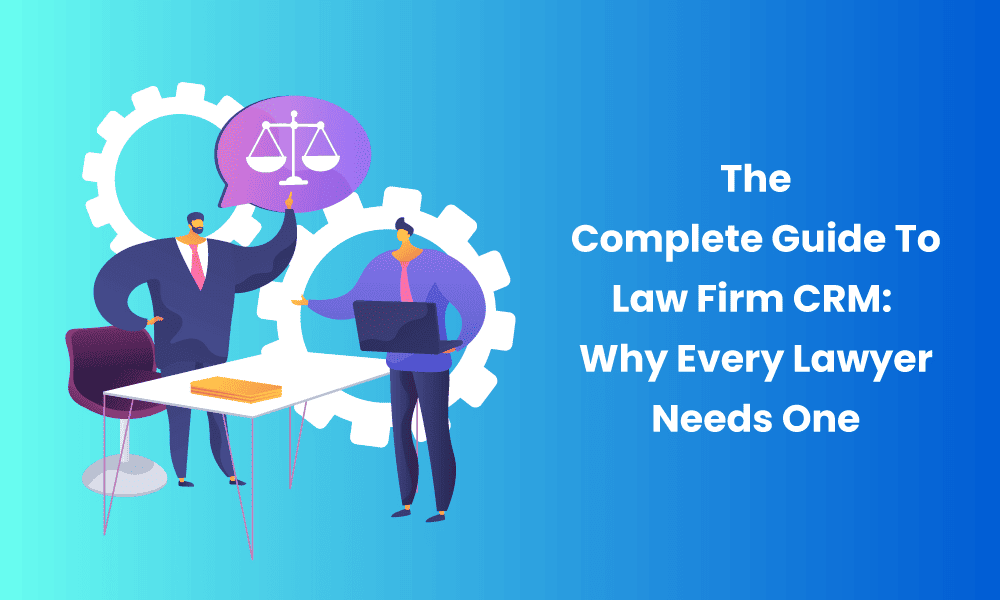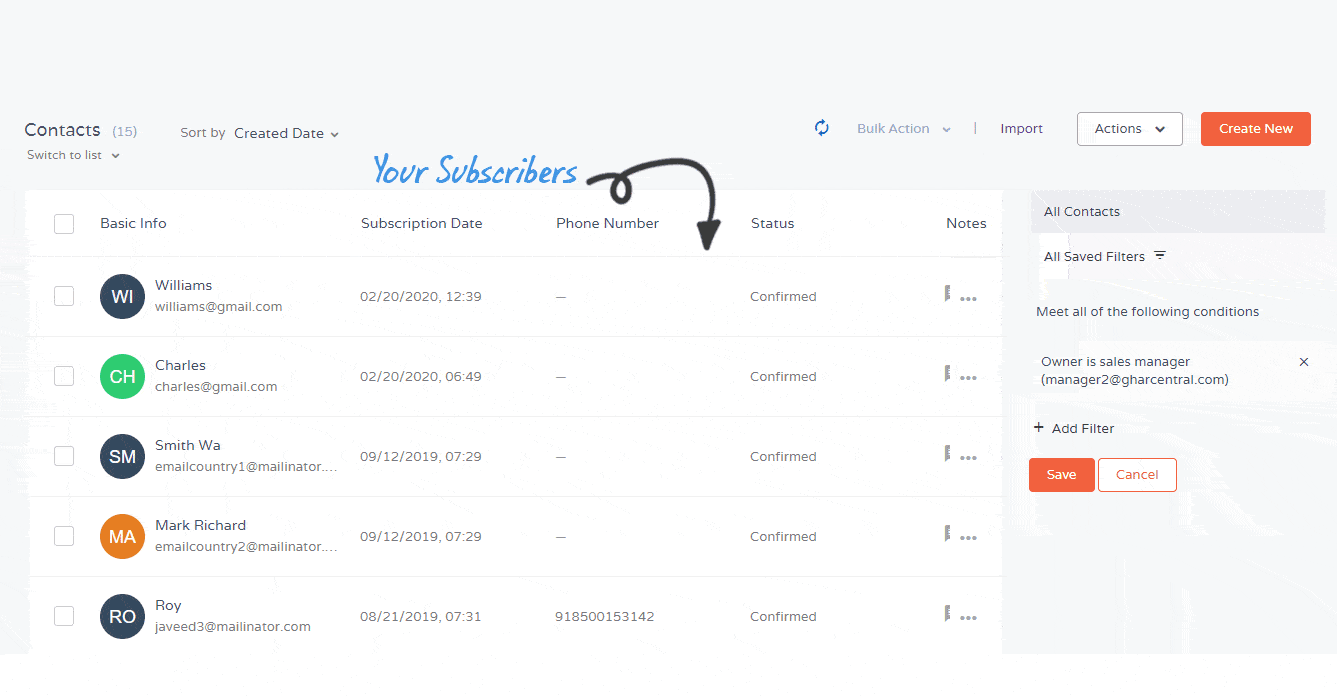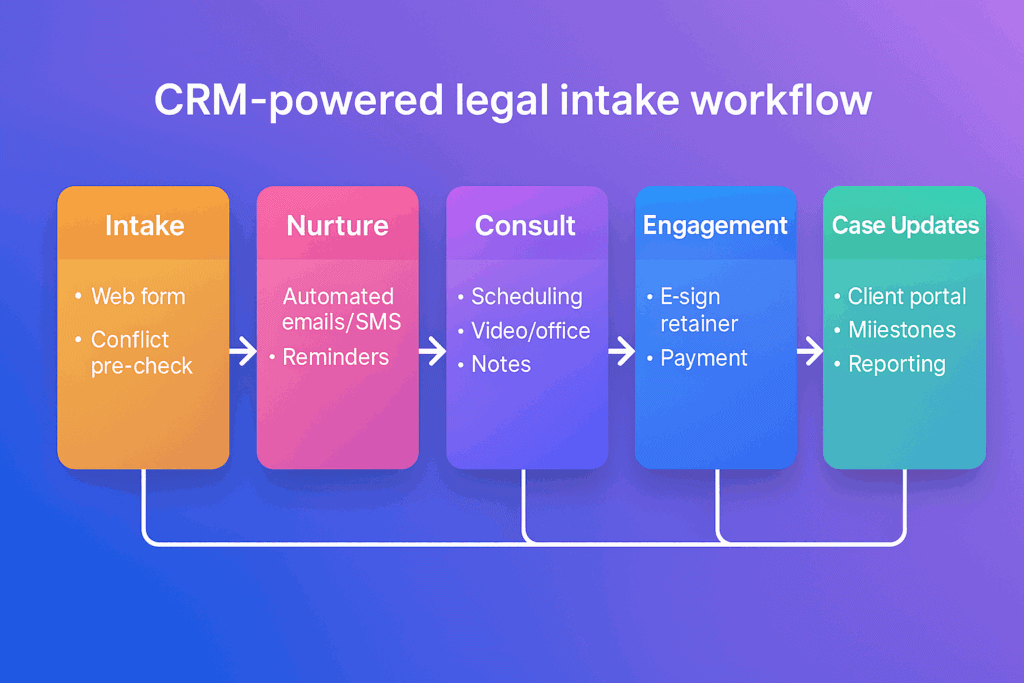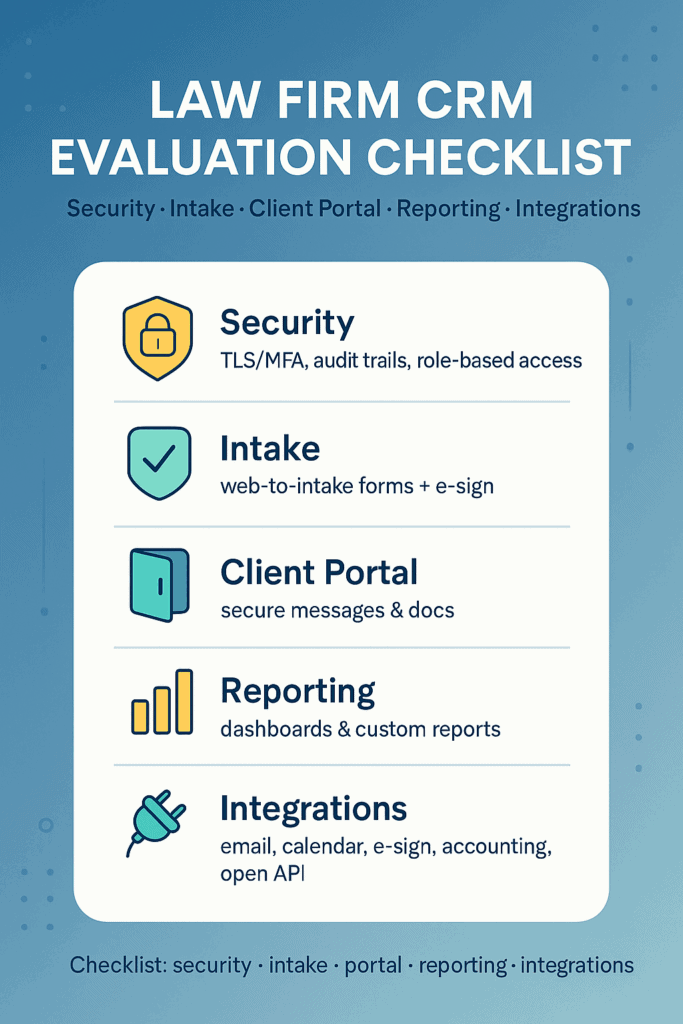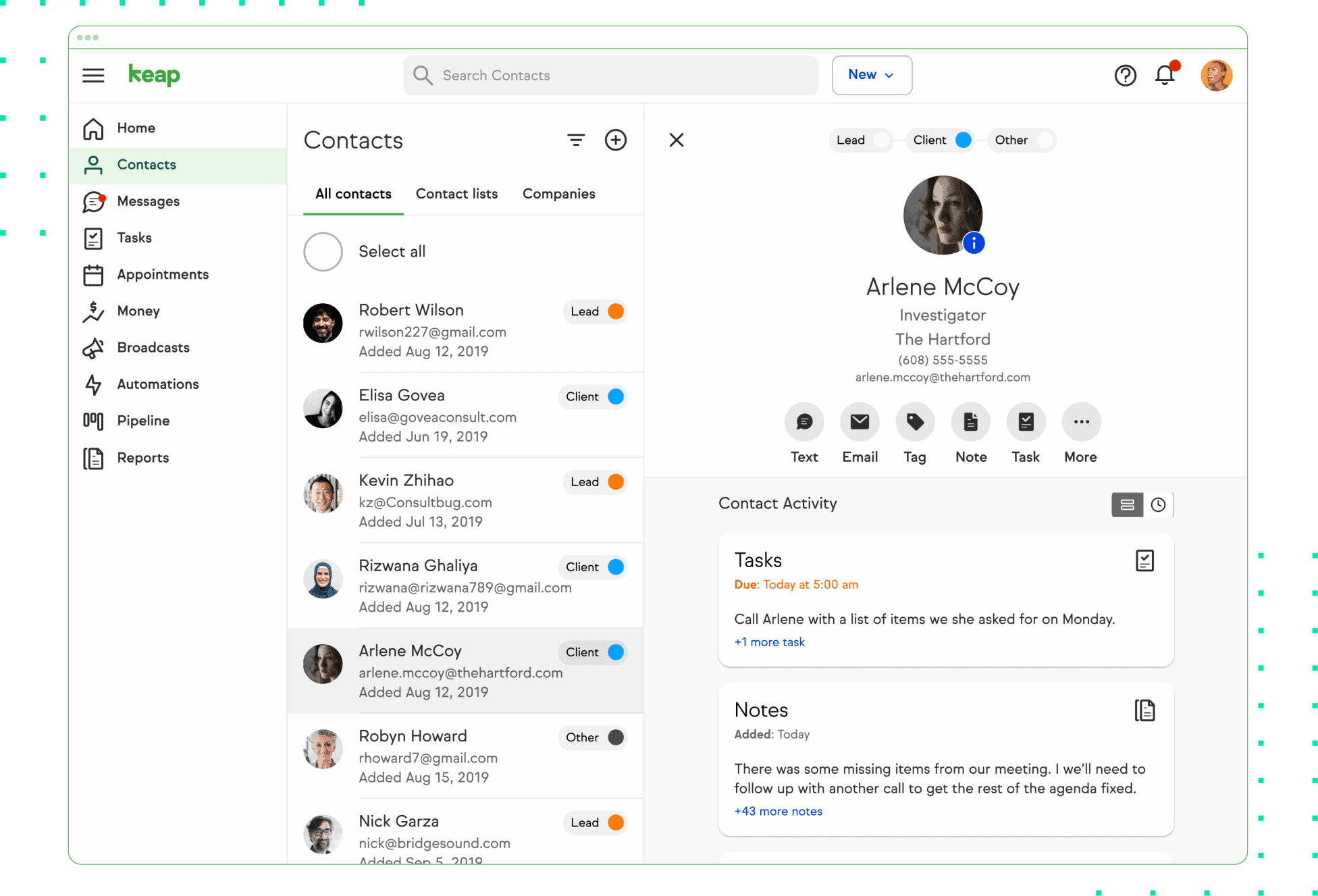Client relationship management is a challenge for any business or firm irrespective of the industry or vertical.
Law firms, particularly, need to maintain good client relationships because their business depends on it.
Managing client communications and relationships requires a lot of resources. This is where a law firm CRM can help.
This legal CRM software can vastly improve case management and client relationship management and make handling large volumes of paper documentation easy.
If you run a legal clinic or a law firm, then you know how easy it is to lose track of information in piles of paperwork unless you deploy a client intake software for law firms.
Client follow-ups and communication also take a significant amount of coordination.
In fact, 26% of legal service firms dread tracking their leads.
The problem is, without proper documentation and follow-up, a potential new client might fall through the cracks.
Legal CRM software solutions are designed specifically to meet the needs of law firms.
Just as a company needs new customers, law firms need to sign new clients to keep growing their business and for this, they require a law practice CRM.
This article will help you understand the benefits of law firm CRM, how it can help your firm, and choose the best one.
Table of Contents
What Is a Law Firm CRM?
A law firm CRM (customer relationship management) tool or software is a suite of applications that helps you manage all your client relationships and interactions.
A CRM system streamlines all essential processes: you can document potential clients and current clients, store paperwork, organize and manage your staff, track business growth, and more.
Given the volume of data a law firm deals with on a daily basis, it’s critical to invest in a platform where all data can be stored for each practice area, covering all aspects of business development.
Why Does Every Law Firm Need a CRM Software?
A CRM software has a straightforward goal – improve your processes and build stronger client relationships.
In fact, about 84% of law firms saw an increase in their overall work efficiency using legal technology.
Whether you are a small law firm or a large one, using a CRM tool is a must.
Law firms are responsible for keeping track of a lot of paperwork – client intake, contact information, invoicing details, past conversations, and emails.
Even if you run a small firm, your staff can still struggle with managing it all.
Every law firm needs easy contact management, streamlined team collaboration, effective and quick communication with clients, and tech aid for productivity enhancement.
You can use different software applications for each of those.
OR,
Use a CRM for your law firm.
This can be a single platform to keep a tab on your legal team’s tasks, improve communication with your clients and your team, and store all your legal documents on a cloud safely.
Maybe the system you have currently works for your legal firm. But what about the long-term?
When your legal firm grows, so does your client base. Let’s look at a few benefits of a legal CRM software.
EngageBay can be your free-forever contact management software, with automation features and 360-degree client views.
Legal-Specific vs General CRMs: What’s Right for Your Firm?
Picking a CRM often comes down to one question: do you need law-specific workflows out of the box, or would a general CRM with strong automation cover you (plus a few legal add-ons)?
Here’s a crisp, side-by-side to help you decide.
| Dimension | Legal-Specific CRM | General CRM |
|---|---|---|
| Core workflows | Built for legal intake → matter creation → time/billing → trust/IOLTA; conflict checks, matter pipelines, court calendaring are typical. | Lead/contact management, sales pipelines, tasks, email/SMS marketing, sequences/automation; no native legal accounting. |
| Billing & trust accounting | Native or tightly integrated legal billing and trust accounting to support compliance. | Invoicing/quotes via generic tools or integrations; trust accounting usually not included. |
| Intake & client portal | Legal intake forms, e-sign, client/matter portals designed for attorneys. | Forms, meeting links, generic portals; can be adapted but not legal-specific. |
| Compliance & risk | Conflict checks, role-based visibility, audit trails aligned to legal practice needs. | Standard CRM permissions; conflict checks require custom process/integrations. |
| Marketing & BD | Usually “good enough” (email, basic funnels); some platforms are stronger here than others. | Typically stronger marketing automation, segmentation, and reporting across the full client lifecycle. |
| Setup speed | Faster for law workflows; less customization to be “practice-ready.” | Faster for general sales/marketing; legal workflows require tailoring. |
| Total cost | Subscription plus (sometimes) add-ons; value is highest when you’ll use matter + billing + trust together. | Often lower entry cost (free/low tiers) and broad features; may add costs for legal-specific integrations. |
When a Legal-Specific CRM Fits Best
-
You need trust/IOLTA accounting, conflict checks, matter timelines, and legal billing in one place.
-
You want intake → matter creation and client portal workflows to work day one with minimal customization.
-
Your risk posture requires purpose-built compliance features (auditability, ethical walls).
Security for Legal CRM (encryption, audit trails, access controls)
Protect client data with non-negotiables that satisfy bar rules and privacy laws:
-
Encryption: TLS 1.2+ in transit and AES-256 at rest; segregate client/matter data.
-
Access controls: SSO/SAML with MFA, IP allowlisting, least-privilege roles, field-level permissions, and matter-level ethical walls.
-
Auditability: Immutable audit logs for logins, views, edits, exports—searchable and exportable for audits.
-
Compliance & residency: Signed DPA/BAA; GDPR/CCPA alignment; SOC 2 Type II/ISO 27001 attestations; regional data hosting options.
-
Resilience: Daily backups, legal-hold/retention controls, documented DR with clear RPO/RTO targets.
-
Client portal security: Secure file sharing, granular access, watermarking/virus scanning.
-
Assurance: Vendor breach-notification SLAs, routine pen tests, and vulnerability management.
When a General CRM Makes More Sense
-
Your primary gaps are lead capture, drip nurturing, and pipeline visibility (e.g., referral tracking, multi-channel follow-ups).
-
You’re comfortable connecting billing/accounting separately and building light legal workflows with custom fields and automations.
-
You want robust marketing, reporting, and service automation spanning intake, consultations, and post-matter relationships.
Quick Decision Checklist
-
Do we require trust accounting or conflict checks inside the CRM? → Choose legal-specific.
-
Is marketing automation + pipeline reporting our top priority? → Choose general CRM.
-
Are we aiming for fast, practice-ready setup with minimal admin? → Legal-specific.
-
Do we want maximum flexibility and lower entry cost today, even if we stitch in billing later? → General CRM.
Bottom line: If your firm lives and dies by matters, trust compliance, and conflict management, a legal-specific CRM reduces risk and setup time.
If your growth bottleneck is marketing and pipeline orchestration, a general CRM can be more powerful (and cheaper to start), provided you’re okay integrating legal billing and compliance workflows separately.
TL;DR: If you need intake, e-sign, conflict checks, and trust accounting, choose a legal-specific CRM. If you want omnichannel marketing + sales automation at SMB prices, a general CRM (like EngageBay) fits.
| CRM | Type | Intake & e-sign | Client Portal | SMS/Texting | Notable Legal Features | Pricing (from) | Best for |
|---|---|---|---|---|---|---|---|
| Clio Grow | Legal | Yes | Yes | Add-ons | Intake, templates, reminders | $49/user/mo | Firms adding intake to Clio |
| Lawmatics | Legal | Yes | Yes | Yes | Automated intake, e-sign | Contact sales | Marketing-heavy firms |
| MyCase | Legal | Yes | Yes | Yes | Trust accounting, billing | $39/user/mo | All-in-one practice mgmt |
| PracticePanther | Legal | Yes | Yes | Yes | Time, billing, workflows | $49/user/mo | Growing firms |
| Smokeball | Legal | Yes | Yes | Yes | AutoTime, deep MS Office | $49/user/mo | Doc-heavy practices |
| EngageBay | General | Via forms + e-sign apps | N/A | Yes | Automation, sequences, lead scoring | Free plan | Intake + marketing automation |
Benefits of Using a CRM for Lawyers
Let’s talk about the most obvious ones first.
Manage Client Relationships Better
Your first job is to keep your existing clients satisfied while also prospecting for new ones.
It’s important to structure the process of client intake to make sure that the paperwork isn’t overwhelming or stressful.
A legal CRM software can automate your client intake process and store it on a common dashboard.
How to Create Email Marketing Sequences Using EngageBay
A law firm CRM can also help you keep your clients informed about any case updates and easily share legal paperwork with your clients.
A CRM can greatly streamline client follow-ups and case management for specialized legal practices, especially in personal injury by improving communication and support, much like how auto accident lawyer efficiently handles complex accident cases.
For example, a car accident lawyer Vero Beach often benefits from centralized client data and timely updates when handling fast-moving accident claims and related documentation.
In fact, many legal CRM solutions have pre-defined templates and forms for maintaining just these relationships.
Handle Your Staff Members Efficiently
When you are dealing with a large pool of employees or several people are involved in a single project, everyone must be on the same page.
Generate Appointment Links — EngageBay
A CRM tool for law firms can give you a holistic view of your team’s activities.
You can easily schedule tasks for your staff, organize tasks, by practice area, and get insights into their performance.
A legal CRM software can also ensure your lawyers are not double-booked with different clients. With appointment scheduling and an in-built calendar, you can schedule team or client meetings without the need for any other app.
Manage All Documents Digitally
Many law firms are now shifting towards maintaining digital records of their clients.
If your law firm is also aiming to be paperless, it’s crucial to have an easily accessible portal for storing client data and using a legal document creator can make generating and managing digital documents far more efficient.
Digitizing documents can be time- and resource-intensive, but a law firm CRM system, combined with legal intake software will be able to store and organize all paperwork securely.
Furthermore, you will also save a lot of time and money. Even established firms like Luhrsen Goldberg can benefit from such systems to manage sensitive client files and case records with efficiency and confidentiality.
Analyze Overall Performance of Your Law Firm
Another significant advantage of a CRM for law firms is its ability to track the overall performance of your business.
With legal CRM software, you can track your firm’s performance across all areas of client service and relationship management.
You can keep track of various metrics and every practice area, including how many clients have hired your services, how many cases were closed, and which sources or channels are working best for your legal firm’s client intake.
All this information can help you determine what needs to be improved in your case management.
The best CRM systems would enable you to visualize the results of these analyses in the form of charts and graphics that are easy to understand.
This way, you can spend more time on developing business development strategies instead of wasting time at manually tracking and analyzing business performance.
How to Choose the Right CRM for Your Legal Services Firm?
Not every CRM system will meet your law firm’s requirements.
You need a legal CRM that fits right into your firm’s budget and legal plus business needs.
The right law firm CRM platform will add value to your business and make operations easy. If it doesn’t simplify your law practice management, then it’s not a good investment.
When you invest in a client relationship management CRM, more than the features, you should focus on fulfilling your key objectives.
Are you looking for a CRM software to generate new leads, or as a workflow management tool? Do you want your CRM to help improve communication with clients, track and enhance business revenues and operations or only store sensitive documents?
Automations in EngageBay
Once you figure out your firm’s priorities, it’s easier to shortlist a CRM software that is made for your core requirements.
Here are a few other factors to consider:
Budget
The whole purpose of using a law firm CRM solution is to increase efficiency and maximize your profits. If you’re a small firm, then investing in an expensive CRM is not sustainable.
The pricing of the CRM must be affordable and reasonable. It shouldn’t burn a hole in your pocket.
Vendor Reputation
You will be establishing a long-term relationship with the vendor.
Read their old testimonials and online reviews. Identify the pain points and check if those issues have been resolved.
You can also check how engaged they are with their customer base, and how the customer service experience is.
Integration
This might seem more like a feature, but the significance of integration can’t be overstated. If your law firm CRM requires you to build custom integrations, you’re at greater risk for security breaches and bugs.
In-built integration of different automation modules enables you to easily manage the different practice areas of your legal firm, without having to shuttle between a dozen apps.
Law Firm CRM Evaluation Checklist
Use this quick checklist to compare legal CRMs at a glance—intake, compliance, billing, portals, and integrations—so your firm can shortlist the right fit fast.
Checklist
Intake forms + e-signatures
Conflict checks
Matter notes & chronology
Role-based permissions
Audit trails & change logs
Calendar sync (Outlook/Google)
Text/SMS and call logging
Secure client portal
Reporting & dashboards
Open APIs & native integrations
Expanded evaluation (add ✅/❌ and notes)
Intake & Onboarding
Online intake forms → auto-create contact/matter
E-signature for retainers & fee agreements
Duplicate detection + referral/source tracking
Compliance & Risk
Conflict checking across contacts, related parties, entities
Role-based permissions (partners, associates, paralegals, vendors)
Field-level or matter-level access controls; ethical walls
Audit trails (who changed what & when), exportable logs
Matter Management
Matter notes, timelines, and custom fields
Task templates & workflows by practice area
Document automation (templates/merge fields) + versioning
Global search across matters, docs, emails, notes
Calendars & Communication
Two-way calendar sync (Google/Outlook) + reminders
Text/SMS with opt-in, templates, and matter linking
Email tracking, templates, mail merge, and shared inbox
Client portal (secure messaging, docs, status updates)
Time, Billing & Trust
Time capture (manual, timers, or automatic)
LEDES LEDES-compatible billing; batch invoicing
Trust/IOLTA handling with three-way reconciliation
Online payments (cards/ACH) with fee settings
Automation & Productivity
No-code workflows (triggers, if/then, reminders)
Intake → matter creation → onboarding sequences
Task SLA timers and escalations
Reusable email/SMS templates and playbooks
Reporting & Analytics
Matter pipeline, utilization, realization, WIP, AR aging
Source/ROI reports for marketing channels
Custom report builder + scheduled email exports
Integrations & API
Native integrations (Word/Outlook, Gmail, Drive/OneDrive, e-sign, accounting)
Open REST API & webhooks; sandbox/testing environment
Data importers (CSV, legacy systems) with field mapping
Security & Data Protection
Encryption in transit/at rest; SSO/MFA
Regional data hosting options; backups & retention controls
DPA/BAA availability; audit & compliance attestations
Usability, Support & Costs
Role-based onboarding, in-app guides, and templates
Live support SLAs, training library, migration help
Transparent pricing (users, matters, storage, texts, e-signs)
Contract terms, export rights, and data portability
Scoring Template
| Criterion | Must-Have (Y/N) | Score (0–2) | Evidence/Notes |
|---|---|---|---|
| Conflict checks | Y | ||
| Trust/IOLTA + 3-way rec. | Y | ||
| Intake + e-sign | Y | ||
| Client portal | Y | ||
| Calendar sync | Y | ||
| Text/SMS | N | ||
| Reporting & dashboards | Y | ||
| Open API/integrations | N |
Tip: Mark must-haves “Y,” score each item 0–2 (0=absent, 1=basic, 2=robust), then total. Shortlists get a quick apples-to-apples comparison while keeping your page scannable and snippet-friendly.
10 Best CRM For Law Firms
Let’s look at the top ten legal CRMs that you can consider for your business.
1. EngageBay
EngageBay is flexible enough to suit the needs of a law firm.
This all-in-one tool offers a free CRM solution integrated with marketing automation features, so lawyers can easily store, update, and track their contacts database, documents, and pending tasks, and delegate to the software the entire process of client intake and management.
EngageBay has an excellent user-friendly user interface (UI) since it is designed for small business owners with no tech skills.
It can capture your leads from your website and prioritize them based on how well they respond to your emails or SMS, thanks to its AI-based predictive lead scoring. You can say goodbye to manual client intake.
This powerful software can also automate all your email broadcasts, email and SMS responses, task management, and service workflows.
This all-in-one tool offers a free CRM solution integrated with marketing automation features, so remote law professionals can easily store, update, and track their contacts database, documents, and pending tasks, and delegate to the software the entire process of client intake and management.
Main Claim
EngageBay aligns marketing, sales, and support teams around a single 360-degree view of all clients. It offers custom fields to generate reports the way you’d like to understand your business performance.
Pros
- Free to use forever
- Pre-designed email templates that can be customized easily
- Email sequences to convert more leads
- Inline and popup forms to capture leads from your website traffic
- Free onboarding
- Integrated dashboard, unified solution
- Automation for executing all business tasks and sending out alerts/updates
Cons
- Not law firm-specific
- Limited email templates designs
2. Clio Grow
Clio Grow is Clio’s intake & legal CRM that streamlines lead capture, online intake forms, e-signatures, scheduling, and pipeline tracking, then syncs new clients to Clio Manage. It also offers a lightweight website builder and Local Services Ads connections to help firms attract and convert prospects.
Main Claim
Purpose-built client intake + CRM that automates form capture, document generation, e-sign, and follow-ups—available standalone or bundled with Clio Manage via Clio Complete.
Pros
-
Online intake forms that map cleanly into matters; automated reminders and follow-ups
-
Built-in e-signature and document templates for retainers/fee agreements
-
Pipeline view to track prospects by intake stage; lead source reporting
-
Optional website builder and Google Local Services Ads tie-ins
Cons
-
Intake/CRM only—legal billing/accounting live in Clio Manage
-
Features and pricing are separate from Clio Manage (best value when paired)
3. Lawmatics
Lawmatics is a legal-specific growth platform combining client intake, CRM, and robust marketing automation (email/SMS journeys, segmentation), with a client portal, conflict checking, document automation, and built-in time, billing, and online payments (LMPay).
Main Claim
All-in-one intake + legal CRM + automation built to engage leads automatically and convert them with forms, scheduling, e-sign, and drip campaigns.
Pros
-
Visual pipelines, custom fields, and conflict checks
-
Drag-and-drop email automation with triggers/logic; SMS/MMS messaging
-
Secure client portal for updates and document sharing
-
Document automation + e-sign, plus time/expense tracking and invoicing
Cons
-
Broad feature set can require thoughtful setup to avoid over-automation
-
Pricing is above general CRMs, reflecting its legal focus
4. HubSpot
HubSpot offers a free CRM system that helps you scale your legal business by standardizing your workflow and automating repetitive tasks like data entry. You can set up drip campaigns and schedule follow-ups with your clients.
Its main purpose is to help companies generate more leads and nurture them by automating various marketing activities.
Main Claim
On its dashboard, Hubspot gives you an up-to-the-minute view of your entire sales pipeline.
Pros
- Includes email marketing, sales, and service hubs all connected together
- Works as an easy point of entry for law firms that have never used a CRM
- Has a thriving community of users that provide active and reliable support
- Built-in analytics and reporting solutions with insights into various activities
- Can track client interactions across platforms
Cons
- No law firm-specific functionality
- Best suited for smaller law firms
- Need to pay a monthly fee to access premium tools like Sequences and Prospects
- The pricing plan is not very flexible
5. MyCase
MyCase covers the full client lifecycle—lead capture, eSignature (included), legal CRM, client portal, workflow automation, calendaring, time & billing, built-in texting, and payments through LawPay—with trust accounting and three-way reconciliation.
Main Claim
End-to-end practice management with intake/CRM, communications, and compliant billing/payments in one platform.
Pros
-
Custom intake forms that connect to cases; included eSignature
-
Client portal and two-way text messaging
-
LawPay payments and IOLTA-aware trust accounting with three-way reconciliation
-
Workflow and document automation across matters
Cons
-
Deep billing/accounting features are best realized after process standardization
-
Evolving suite and add-ons may introduce a learning curve
6. PracticePanther
PracticePanther is an all-in-one legal practice suite with case/matter management, automated workflows, invoicing, native eSignature, two-way business texting, broad integrations (Gmail/Outlook, Box/Drive), and compliant trust accounting with three-way reconciliation.
Main Claim
Automation-forward practice management that streamlines calendaring, billing, communications, and compliance.
Pros
-
Trust accounting with three-way reconciliation and IOLTA/ABA safeguards
-
Native eSignature and two-way texting
-
Strong integrations for email, calendars, and cloud drives
-
Tagging and reporting for custom business insights
Cons
-
Rich options/integrations can require admin time to tailor
-
Higher-tier features may sit behind upper plans
7. Insightly
Insightly CRM allows you to spend time on building relationships rather than focusing on data entry.
Its key capabilities include lead routing, bulk email campaigns, and building complex workflow automation.
You can link your existing database to map and better understand complex customer relationships.
With business intelligence features, you can create beautiful data visualizations to discover insights that align with your business or service goals.
Main Claim
This CRM can help build personalized brand experiences by reaching out to potential clients at the right time with the right message.
Pros
- Tracks lead information with activity timeline of email marketing campaign source, phone calls, emails, etc.
- Builds and employs customized apps
- Captures and manages any dataset of leads
- Provides a personalized dashboard to track essential metrics
- Supports two-factor authorization and encryption of data in transit and at rest
Cons
- Troubled integration with third-party apps
- Not law-firm specific
- Can be considered expensive for its features
8. SugarCRM
SugarCRM provides enterprise-class CRM tools for deployment on-premises.
This can be of use to large law firms. Large law firms may find this useful as the platform aims to improve internal collaboration as well as external outreach.
The solution offers a powerful reporting tool that can give you a chart view for 1,000 different metrics.
Additionally,it helps create business processes that combine human tasks with automated aspects of the workflow.
Main Claim
SugarCRM is a perfect solution for legal companies looking for maximum flexibility in customization.
Pros
- A cost-effective solution as compared to other enterprise law firm CRM solutions
- A highly versatile reporting system that helps with smart decision making
- Easily scalable for adding new users and new modules
- Highly customizable web interface
- Offers a rich, intuitive, and easy-to-use interface
Cons
- Not the best option for small- or- medium-sized law firms
- Has a steep learning curve
9. Smokeball
Smokeball emphasizes automatic time tracking (AutoTime), deep Microsoft Word/Outlook integrations, a large automated legal-forms library, intake & onboarding (conflict checks, e-sign), client portal, workflows, and compliant billing & trust accounting—plus optional AI assistants.
Main Claim
“Set-and-forget” automatic time capture tied to matter activity, paired with powerful document automation and billing.
Pros
-
AutoTime captures activity automatically across Smokeball/Word/Outlook
-
Extensive automated forms library and document automation
-
Client portal, intake/onboarding, conflict checks, and e-signature
-
Built-in trust accounting and online payments
Cons
-
Windows/Microsoft-centric workflow may not suit browser-only teams
-
Auto-time benefits are maximized when the firm works primarily inside the ecosystem
10. Keap (Infusionsoft)
Keap aims to increase your sales by combining the functionality of CRM, marketing, and sales automation into a single platform.
The platform makes it easy to migrate from your existing platforms that include ActiveCampaign, AWeber, ConstantContact, HubSpot, MailChimp, and Ontraport.
This law firm CRM tool was formerly known as Infusionsoft.
Keap helps automate the whole process of capturing and converting leads by providing personalized experiences.
Main Claim
Keap integrates with 1,000+ applications to help you manage your business in one place.
Pros
- Offers call support and has built-in guides on its platform for easy training
- Provides robust email tools to automate follow-up and close more deals
- Powerful law firm marketing automation tools that include A/B testing and lead scoring
Cons
- Has a steep learning curve
- Has a bit messy user interface
- Can be expensive for a small law firm
Wrap Up: Which CRM Suits Your Law Firm the Best?
A law firm CRM streamlines all your legal service tasks on one platform.
These include storing mountains of paperwork in one secure cloud space, coordinating with legal assistants and clients, and tracking your contacts for any new information.
Searching for the right legal CRM doesn’t have to be complicated. If you’re clear on the functionalities you require,you can easily filter through the options we’ve given above.
EngageBay is the best free CRM solution for any legal firm.
It enhances team communication and ensures that all your clients receive important updates on time, with minimal effort on your part. You get tons of integrations, access to a knowledge base, security features and more – all for free.
Also, upgrading for advanced automation features costs only a tiny fraction of what most other tools charge.
If you want to know more about how you can tailor EngageBay to suit your law firm’s needs, reach out to us and we’ll schedule a demo.

A: For solos/small firms focused on intake + follow-up, a general CRM with automation can work; for conflict checks/trust accounting, pick legal-specific.
A: Usually via native connectors or open APIs that sync contacts, matters, calendars, documents, emails, and notes—prefer two-way sync and SSO to avoid double entry.
A: Plan for ~$39–$149/user/month for legal-specific tools (plus texting/e-sign fees), with 3–10 user firms budgeting roughly $200–$1,200/month and a one-time migration cost.
A: Web-to-intake forms, instant scheduling, e-sign retainers, automated email/SMS follow-ups, and a mobile-friendly client portal.
